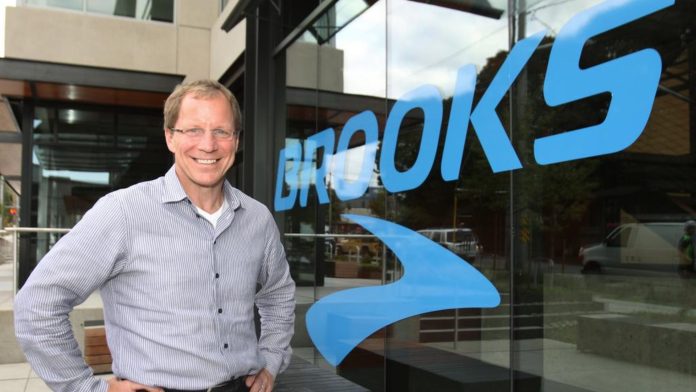The longstanding CEO of Brooks Running, a subsidiary of Berkshire Hathaway, Jim Weber, is set to step down after more than two decades at the helm, the company will announce on Tuesday.
Brooks veteran Dan Sheridan, who joined the company’s marketing team in 1998 and steadily rose to the positions of chief operating officer and president, will assume the role of CEO on April 26.
Weber, credited with rescuing Brooks from financial ruin, navigating it through ownership changes, and transforming it into a billion-dollar brand, expressed mixed emotions about his departure.
Despite describing his tenure as the “best job in the world,” Weber, who battled cancer in recent years, expressed a desire to scale back and achieve a better work-life balance.
Reflecting on his tenure, Weber remarked, “I’m super proud of what we built. I’ve been CEO for 23 years and if I add two years in front of that as a board member, it’s been 25 years so it’s just been such a great run.
We’ve got a company that’s achieved a lot and has incredible opportunities looking ahead. We’ve got momentum right now.”

Sheridan, who has played an increasingly significant role in Brooks’ recent growth trajectory, inherits a thriving business. Last year, the company’s global sales surpassed $1.2 billion, with substantial growth in North America, which accounts for 80% of its revenue.
Looking to the future, Sheridan aims to expand Brooks’ global footprint and diversify its product range. Plans include opening the brand’s first retail store in China, a pivotal market, and bolstering direct sales in the U.S. while strengthening wholesale partnerships in Europe.
Sheridan acknowledged the favorable position he steps into as CEO, noting, “I’m lucky because not many new CEOs get to step in and inherit what I would call a sound business, a sound culture, and a sound brand, and the strength that we have is pretty unique.
So I don’t have a turnaround, I don’t have to come in and make sweeping changes.”
Succession planning has been a priority for Brooks since it became a Berkshire Hathaway subsidiary in 2012.
Weber revealed that Warren Buffett insisted on knowing each CEO’s chosen successor annually, a practice that prompted the company to formalize its succession planning process, ultimately leading to Sheridan’s appointment.

Weber identified Sheridan’s potential for leadership early on and actively groomed him for the role. Over the past five years, Sheridan gained exposure to various aspects of the business, allowing him to contribute to strategic decision-making.
Weber noted, “His fingerprints, in the last 24 months, are on our strategy.”
Despite Sheridan’s readiness for the challenges ahead, Weber cautioned that uncertainties such as economic fluctuations, supply chain disruptions, and intense competition pose ongoing challenges.
Sheridan acknowledged the importance of judgment in navigating such complexities, a trait he honed under Weber’s guidance.
He remarked, “I think the thing that I’ve learned the most in my time with Jim is that in these roles that are super hard, judgment is the most important thing for any leader.”


